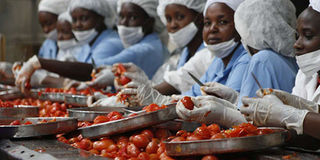International Finance Corporation and Twiga Foods in deal to enhance food safety.

Employees sort tomatoes in a jam-making enterprise.FILE PHOTO | NMG
What you need to know:
- The programme will first work with 30 pilot farms across 20 counties to achieve GLOBAL GAP certification by end of next year.
- Without food safety, there cannot be food security and Sub Saharan Africa has the highest per capita rates of food-borne complications.
- The Twiga Foods platform uses mobile phone technology to connect smallholder farmers in rural areas with informal retail vendors in the city and hence eliminating the requirement for middlemen.
World Bank Group’s International Finance Corporation (IFC) and food distribution company, Twiga Foods, have signed a deal to enhance safety of food in the country.
The agreement, complements an initial Sh1billion investment by IFC, the Global Agriculture and Food Security Programme (GAFSP) and TLcom, a Pan Africa venture capital firm, to expand the operations and offer new services at Twiga Foods.
IFC's Regional Director for Eastern Africa, Jumoke Jagun-Dokunmu indicated that the investment is essentially targeted at improving food safety standards while ensuring fair prices and transparent sourcing from smallholder farmers.
“Twiga Food, will work with IFC to coach farmers on best agricultural practices and ensure that produces are fully traceable. The programme will first work with 30 pilot farms across 20 counties to achieve GLOBAL GAP certification by end of next year,” said Ms Jagun-Dokunmu.
She noted that in the signed deal, the two organisations have also put an additional Sh32million, which will facilitate certification, as well as further training on food safety.
Mrs Jagun-Dokunmu further indicated that without food safety, there cannot be food security and that Sub Saharan Africa has the highest per capita rates of food-borne complications.
“The private sector, is a powerful driver for ensuring a country’s food safety and security and hence why we work with the likes of Twiga Foods,” she said.
Twiga Foods CEO, Peter Njonjo said food safety is an important consideration in their mission to provide affordable quality and safe nourishment to Kenya’s urban consumers, as well as reliable markets for farmers.
“By March 2021, we hope to have attained 100 percent product traceability and GLOBAL GAP certification for all our contracted supplier farmers. We will largely rely on technology to attain this traceability as we strive to ensure that whatever we produce locally, meets international food safety standards,” said Mr Njonjo.
Mr Njonjo similarly indicated that rather than use middlemen, they will focus on dealing directly with farmers to enhance food safety through traceability, as then, it will be much easier to know the source of the produce they deal with.
“We handle an average of 130 tons of produce daily and this is sourced from 13,000 farmers and aggregated from our collection points across 20 counties, then distributed to vendors in Nairobi and nearby counties. This, the more reason we have to ensure the safety of these produces’ consumers,” said Mr Njonjo.
The Twiga Foods platform uses mobile phone technology to connect smallholder farmers in rural areas with informal retail vendors in the city and hence eliminating the requirement for middlemen.





